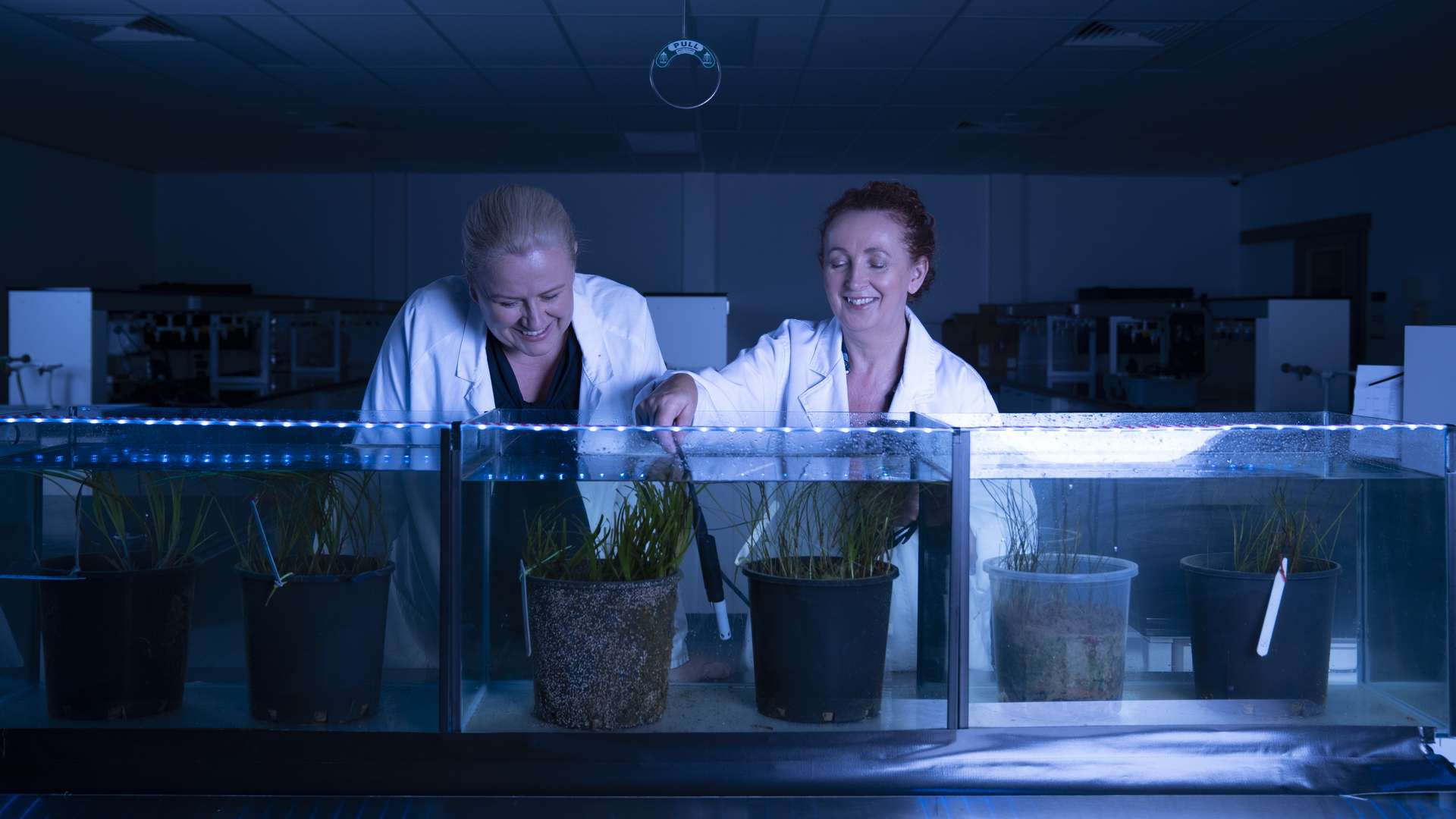
The Coastal Marine Ecosystems Research Centre (CMERC) is home to a diverse team of researchers, scientists, and technical staff dedicated to understanding and protecting coastal and marine environments. Find out more about our team members, their areas of expertise, and the collaborative work driving innovative solutions for coastal ecosystem health and sustainability.
Professor Emma Jackson is the Director of the Coastal Marine Ecosystems Research Centre and a Research Fellow in Marine Ecology. She has more than 20 years of research expertise in the areas of fisheries ecology, seagrass landscape and restoration ecology, impacts on marine species, coastal marine habitats and ecosystem health indicators. Her research is driven by the idea that coastal development is an ever-increasing human activity, but that there are ways in which this development can work with nature rather than against it to maintain ecosystem health, in turn supporting our health and wellbeing as humans.
Currently, Emma leads a research program on the construction of a science-based framework for seagrass restoration in Queensland, but her past and present research areas include marine conservation management, ecosystem services, marine ecology and marine angiosperm.
Professor Iain Gordon holds honorary appointments with the Fenner School of Environment and Society at the Australian National University, Central Queensland University, the James Hutton Institute, CSIRO, and he is an Associate of Reef Ecologic. He was recently the Deputy Vice Chancellor (Division of Tropical Environments and Societies) at James Cook University and prior to that led the James Hutton Institute (Scotland), focusing on evidence-based solutions for the use of land for agriculture whilst maintaining natural resources and ecosystems. Iain has worked across a broad range of areas, including pest management in the Wet Tropics, biodiversity conservation in Africa, Asia, South America, Europe and Australia and land and catchment management to protect the Great Barrier Reef. Professor Gordon is on the Board of the Wet Tropics Management Authority and he is Chair of the Board’s Scientific Advisory Committee. Iain has a passion and commitment for sustainable regional development and harnessing the tropics’ enormous potential through education and research.
Associate Professor Nicole Flint is a Principal Research Fellow in the School of Health, Medical and Applied Sciences. Nicole has been a researcher at CQUniversity since 2011. She has postgraduate qualifications in fish biology (PhD) and economics (MEcon) and previous work experience in fisheries and management and sustainability. Her research focuses on improving the monitoring, assessment and management of aquatic environments; environmental report cards; and generating data to support management of industries including fisheries, ports and water supplies. She is particularly interested in the diverse catchments, rivers and estuaries of Northern Australia, and the communities and industries that they support. Nicole is a member of the Fitzroy Partnership for River Health's Independent Science Panel and the Regional Report Cards Technical Working Group, and represents research active staff members on CQUniversity’s Research Committee.
Dr Angela Capper has more than 20 years of experience in marine ecotoxicology, with strong interests in pollutants and contaminants and their fate in the environment, biological matrices and risks to human health. Her research focuses on: the impacts of anthropogenic contaminants (microplastics, PFAS, heavy metals); co-existence of aquaculture and fisheries (impacts of chemical therapeutics to non-target organisms); seafood security (ciguatera fish poisoning - CFP); and marine chemical ecology (Harmful Algal Blooms - HABs). She has worked in multidisciplinary teams around the globe, liaising with government agencies, scientific institutions, health-based institutes, non-profit organisations, stakeholders, fishermen and community groups.
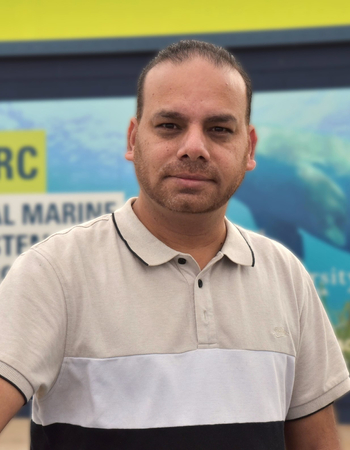
Dr. Manoj Kumar, a Senior Research Fellow at the Coastal Marine Ecosystems Research Centre at CQUniversity, brings over 15 years of expertise in the fields of seaweed (macroalgae) aquaculture, ecophysiology, and molecular biology. His research pursuits revolve around a globally significant theme – evaluating the resilience of marine plants and algae, encompassing seaweeds, seagrasses, and microalgae, amidst the challenges posed by global climate change. Driven by cutting-edge systems biology-based 'omics' approaches, Kumar's recent endeavors include the development of environmentally friendly and sustainable technology for zero-waste seaweed biomass processing, with a focus on bioplastic and biochar production within a biorefinery framework. This initiative was financially supported by philanthropic organization – Julius Baer Foundation (Switzerland).
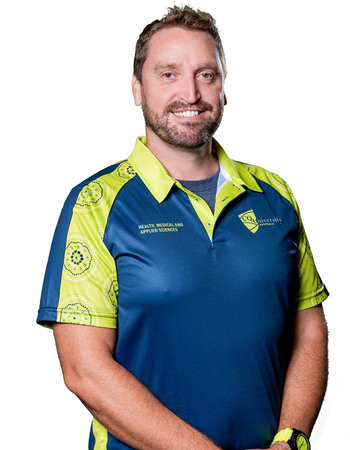
Andrew Irving joined CQUniversity in 2013 as a senior lecturer specialising in marine and environmental ecology, evolution, experimental design, and statistical analysis. His research interests primarily focus on the ecology of marine habitats, particularly marine plants such as seagrass meadows, salt marshes, and kelp forests. How much habitats are maintained, how humans disrupt them, how they might recover naturally, and what humans can do to facilitate their recovery (e.g. through habitat restoration) are all central themes to his research. He has published 37 international peer-reviewed manuscripts and four book chapters.
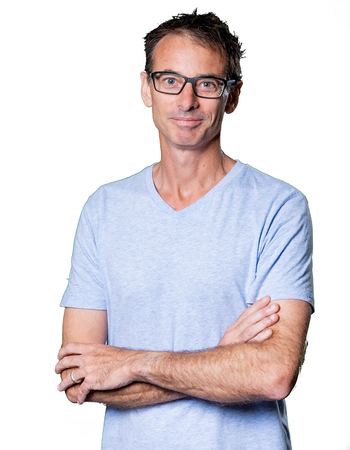
Dr Guy Carton’s research interests are highly varied and include aquaculture, conservation physiology, sensory physiology and ecology. A central question to his research program is how aquatic organisms respond to unprecedented environmental change. He employs various techniques to understand how aquatic animals respond to current and forecasted environmental changes. Of particular interest are increased temperature (climate warming) and shortages in oxygen availability (hypoxia). He is also interested in determining whether physiological attributes may differ between sub-populations of the same species. This research contributes to a knowledge base required to make informed future management decisions within a sustainability framework.
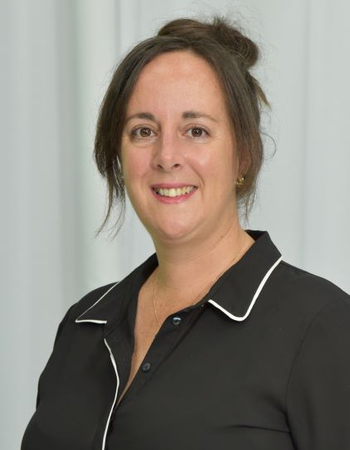
Dr Amie Anastasi’s research is focused on understanding the risk to the environment from the natural and anthropogenic sources of pollutants. She specialises in the management, design and implementation of water quality monitoring and environmental risk assessment studies. Her research in this area has encompassed physical and chemical impacts of pollutants from urban, industrial, agricultural and geological sources. Amie has more than 12 years of research experience in ecotoxicology, chemistry and water quality. Amie has been involved with the Port Curtis Integrated Monitoring Program (PCIMP) since its inception in 2007 and is a member of the PCIMP Technical Sub-Committee. Amie has authored numerous peer-reviewed scientific publications and industry reports while also maintaining a heavy university teaching schedule that allows her to expose students to current best-practice methodologies for the monitoring and management of aquatic environments. She is passionate about Central Queensland Ecosystems and enjoys using science to inform sustainable use of local environments. Amie has a BSc (Chem), BBioMedSc (Hons) and a PhD.
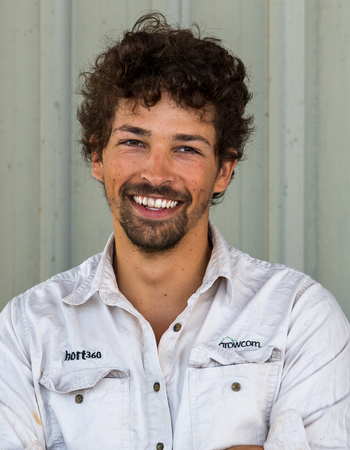
Dr. Charles Cadier is a Senior Research Fellow at the Coastal Marine Ecosystems Research Centre at CQUniversity. He has developed field experiments in tropical coastal wetlands, including mangroves, saltmarsh and seagrass meadows, and brings expertise in assessing coastal ecosystem functions and services. How can we define coastal restoration success, and what strategies can we employ to improve coastal restoration outcomes, are central themes for his research. He collaborated with government and natural resource management bodies to develop coastal rehabilitation projects and monitoring tools. His current research aims to contribute to facilitate large-scale seagrass restoration and improve ecological outcomes from nature-based solutions.
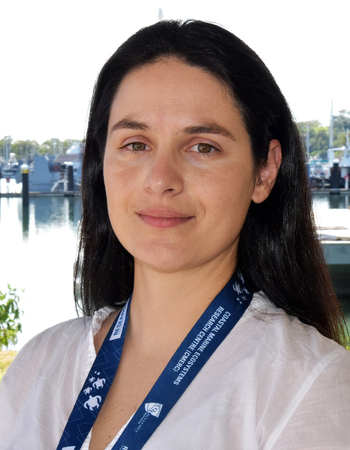
Dr Larissa Patricio-Valerio is CMERC’s Marine Spatial Ecologist. In the past, Larissa has partnered with CSIRO and developed an advanced physics-based remote sensing method to estimate hourly water quality parameters in the Great Barrier Reef from Himawari-8 meteorological satellite observations. She brings her extensive experience in remote sensing, coastal processes, water quality and machine learning techniques to help mapping and monitoring relevant coastal habitats in Queensland.
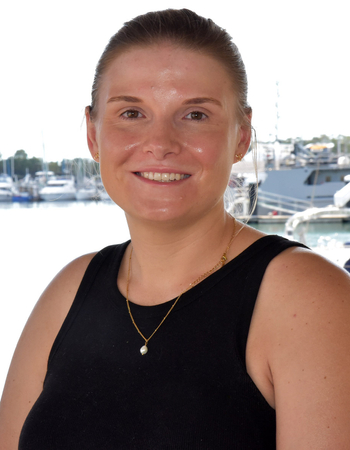
Dr Grace Blackburn is a Postdoctoral Research Fellow at the Coastal Marine Ecosystems Research Centre, whose research focuses on the behaviour and conservation of native Australian birds. Grace recently finished her PhD at UWA, in which she investigated the effects of man-made noise on the behaviour of Australian magpies. She now works at CMERC with the critically endangered Capricorn Yellow Chat, exploring their behaviour, ecology, and the threats they face.
Dr Ziyad Abunada obtained his PhD from Cambridge University, UK, in Civil and Environmental Engineering in sustainable remediation and contaminated land management. His PhD was part of the largest collaborative project between academia and industry in the form of the Soil Mix Remediation Technology (SMiRT) project. He has more than 12 years of industrial experience working on civil engineering and construction projects in developing countries. His research addresses civil and environmental engineering applications, including project management, contaminated land and waste management, water and wastewater treatment materials and technologies, and engineering for sustainable development and decision support systems. In 2017, Dr Abunada’s research was ranked first and awarded the best research prize by ISESCO in environmental management. He was also the winner of the best paper award during AINAC conference in 2012 in UAE. He is currently a member of the Institute of Civil Engineering (ICE) and the Royal Society of Chemistry UK.
Dr Shaneel Chandra is a Senior Lecturer in Chemistry at CQUniversity. He is an analytical chemist by training and his research focuses on several analytical the development of analytical sensors. These sensors find applications in disease detection, environmental monitoring and food quantification. His projects also include analytical detection methods for various applications and several multidisciplinary studies. He also has collaborations with scientists from several areas including microbiologists, public health professionals, human factors specialists, sleep psychologists and the industry.
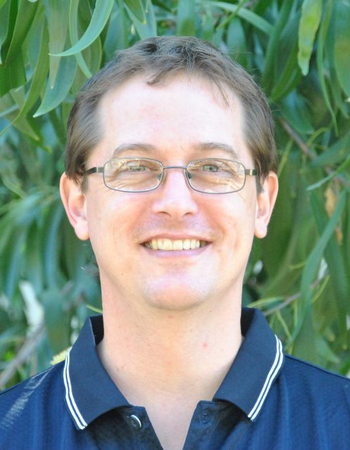
Dr David Vaughan's fields of research include marine parasitology, parasite taxonomy, cleaning symbioses, biocontrol and the investigation of novel methods of reducing problematic parasites in aquaculture. David worked extensively in public aquaria and aquaculture for many years in southern Africa supporting aquatic animal health in large public exhibition collections of fishes and farmed fishes and abalone before moving to Australia in 2015. He received his BSc (Hons) and MSc from the University of the Western Cape in South Africa, and PhD from James Cook University, Australia. David is also a professionally registered scientist with the South African Council for Natural Scientific Professions.
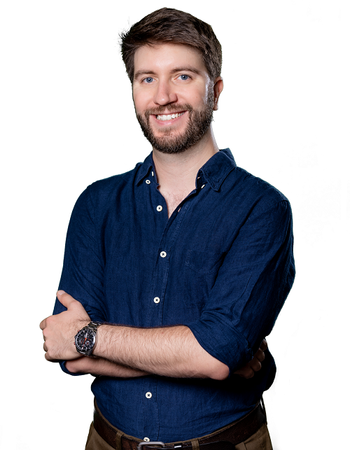
Jeremy De Valck is a transdisciplinary environmental economist (PhD, KU Leuven, Belgium), with strong research interests in natural resource management (MSc NRM, Cranfield Uni., UK) and geographic information systems (MSc Bioscience Eng., Gembloux Agro-Bio Tech, Belgium). Jeremy applies non-market valuation techniques to the study of environmental assets, ecosystem services and biodiversity. Since joining CQUniversity in 2016, he has led or been involved in research projects on assessing socio-cultural, economic and environmental impacts in the Great Barrier Reef region. Jeremy's current research relates to applying revealed and stated preference techniques to value the environment.
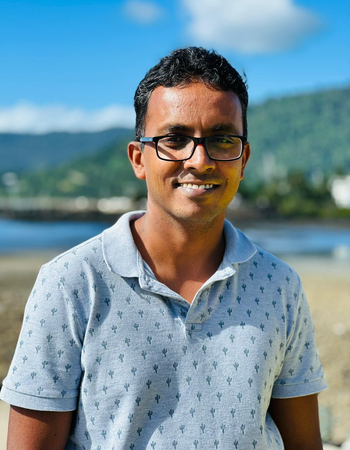
Dr Lasi Piyathilaka completed his PhD in robotics from the University of Technology Sydney (UTS) in 2016. With significant industry experience, he has actively contributed to various university-industry collaboration projects. Currently, he is a lecturer at the School of Engineering and Technology at CQUniversity. Previously, he worked as a Research Fellow at the University of Technology, Sydney (UTS), where his primary focus was developing sensing and robotic systems for inspecting underground infrastructure such as sewers and water pipes.
In recent years, Dr Lasi Piyathilaka has expanded his research interests to include underwater robotic applications and sensing. In 2023, he received an innovation connection grant from the Australian government to develop an underwater robotic system specifically designed for cleaning underwater infrastructure.
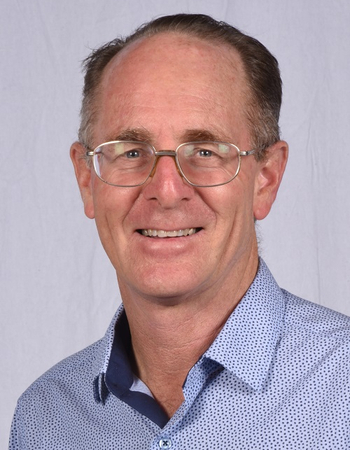
Professor John Rolfe is a resource economist who is a Professor of Regional Economic Development in the School of Business and Law at the CQUniversity Rockhampton and a Fellow of the Academy of the Social Sciences in Australia. John was one of the leaders of the 2013 and 2018 Great Barrier Reef Science Consensus Statements and currently Chairs the Independent Science Panel for the Gladstone Healthy Harbour Partnership. He was Editor-in-Chief of the Australian Journal of Agricultural and Resource Economics from 2013-17 and was President of the Australian Agricultural and Resource Economics Society in 2019.
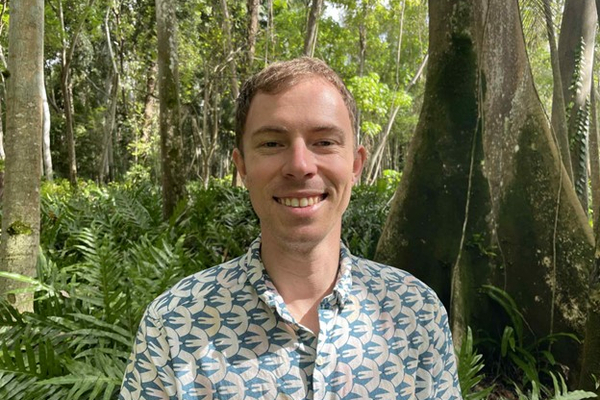
Dr. Conor MacDonnell is a senior postdoctoral research fellow at the Coastal Marine Ecosystems Research Centre at CQUniversity. Conor’s research is focused on seagrasses, improving nursery propagation techniques and increasing the success of field restoration projects. His past work was centered in Florida, USA, an area with extensive seagrass beds under threat from increasing pressures from population growth, water quality, and climate change. Conor collaborated with a range of academic, governmental, private, and non-profit groups, studying improvements to seagrass growth in nurseries using wastewater derived fertilizers (struvite), restoring seagrass propellor scars, and harnessing co-restoration of seagrasses and clams to improve plant growth and survival. Conor also has experience in photography and videography, including directing and co-filming an award winning documentary short, supplementing his research with tools that improve outreach and education on the issues facing our coasts.
Carolyn Lundquist joins CMERC in 2025 as the Principal Research Fellow Coastal Restoration.
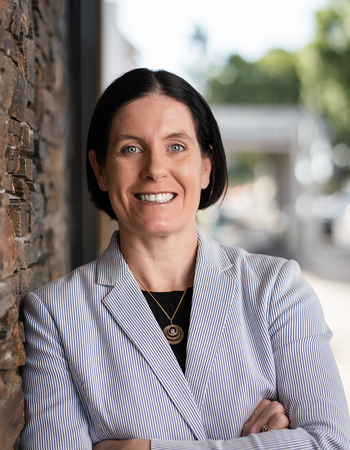
Ms Barbie Keller is the Associate Director (Operations) at Coastal Marine Ecosystems Research Centre at CQUniversity. She is a seasoned operational leader and project manager, bringing more than 20 years of experience across a range of industries. Barbie manages the range of operations at CMERC, facilitating research and centre activities. She joined CQU in 2024 and serves on the Board of Directors at The Oasis Townsville.
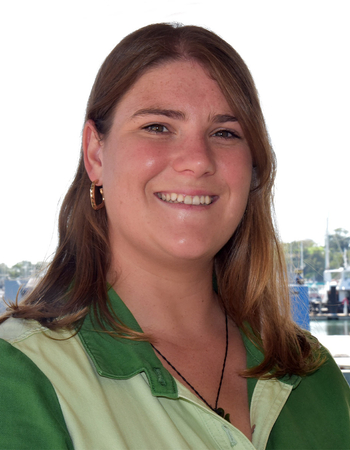
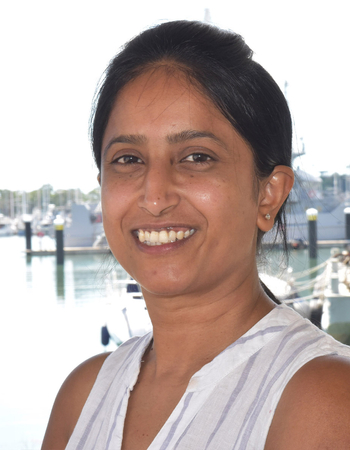
Dr. Nirali Kumar is the Laboratory Supervisor at the Coastal Marine and Ecosystem Research Centre (CMERC), where she leads the coordination and oversight of all laboratory operations. With a strong commitment to scientific excellence and safety, she ensures strict adherence to regulatory protocols while providing vital technical and research support across a diverse portfolio of marine and environmental projects.
Dr. Kumar brings over ten years of experience in analytical and environmental chemistry, marine biology, and laboratory management, spanning both academic and industrial sectors. Her professional expertise encompasses the supervision of multidisciplinary research teams, strategic resource allocation, and the implementation of rigorous quality and safety standards.
She plays an instrumental role in supporting researchers, students, and faculty by enabling the seamless execution of experimental workflows and fostering a collaborative research environment. Dr. Kumar holds a Ph.D. in Biochemistry from the Central Salt and Marine Chemicals Research Institute (India) and has held esteemed roles as a Visiting Scientist in Israel and as a Laboratory Production Manager in Australia. Her passion for science and teamwork makes her a valued member of the CMERC team.
Mr Leon Darby is the Research Support Project Officer at CMERC, responsible for coordinating a wide range of events and projects. With a professional background in water and wastewater operations, agriculture, project management, and surveying across drone, land, and bathymetric platforms, Leon brings a unique blend of technical expertise and operational insight to his role. Since joining CMERC and CQU in 2025, he has contributed to the effective delivery of projects through careful planning and practical field experience.
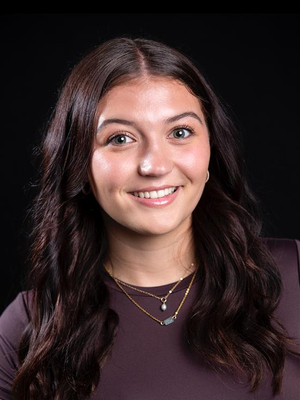
Grace Nord is a Nursery Officer (Research Worker) at CMERC working closely with the seagrass team, collecting and analysing data from the CMERC raceway and mesocosm systems. Grace is currently studying while working with CMERC. Grace enjoys hands on field work and being part of research that helps protect and restore Australia’s coastal environments.
Professor Nevin holds a BSc (Hons) in Biology and Ecology from the University of East Anglia (UK) and a PhD in Wildlife Ecology from Utah State University (USA). He is an experienced senior leader with a demonstrated history of success in higher education and research with professional skills and experience in Ecological Restoration, Sustainable Development, Corporate Social Responsibility, Behavioural Ecology, and Environmental Issues. He is currently CEO of the Western Australian Biodiversity Science Institute (WABSI). WABSI is a joint venture partnership of four universities, four State Government departments, the Commonwealth Scientific and Industrial Research Organisation (CSIRO), and the Western Australian Museum. WABSI has a role in facilitating interactions between researchers, industry, government and conservation practitioners, aligning end-user needs, research capability and diverse funding streams to enhance biodiversity science and conservation outcomes across the state.
Dr Megan Ellis is an Environment Specialist at Gladstone Ports Corporation (GPC). Dr Ellis holds an Adjunct Research Fellow at the Coastal Marine Ecosystem Research Centre through a Memorandum of Understanding between GPC and CQUniversity. Her role at CQUniversity involves developing a strategy to take research beyond environmental components and connect it with other aspects of GPC’s business, as well as CQUniversity’s economics and social science research. Her environmental memberships include the Port Curtis Integrated Monitoring Program Technical Sub-Committee, the Gladstone Healthy Harbour Partnership Management Committee and the Local Marine Advisory Committee. Dr Ellis’ background is in marine science, particularly on sharks and turtles.
CMERC has been established to work with coastal industries and communities to develop practical and sustainable solutions for our unique coast and marine environments.
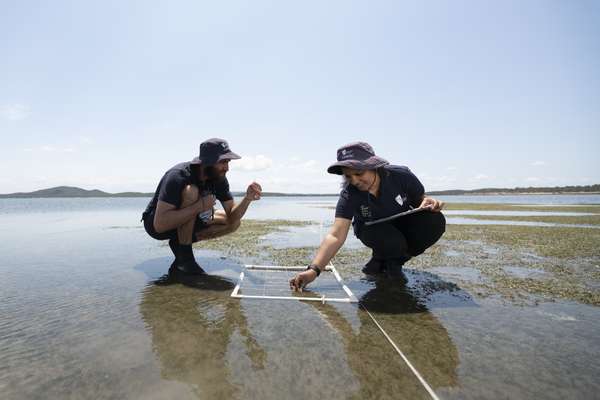
CMERC hosts Phd and Master’s research students across a range of our key programs.
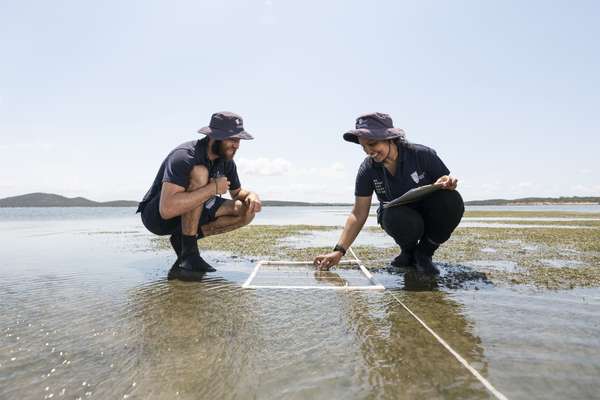
CMERC’s greatest research facilities – the unique ecosystems, industries and communities of the Queensland coast – is right on our doorstep.
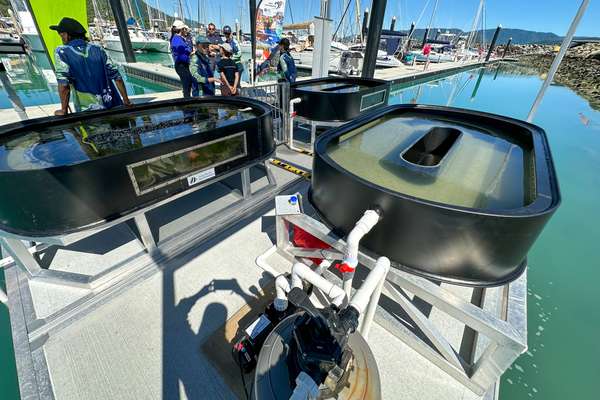
CQUniversity Australia is a trading name of Central Queensland University
ABN: 39 181 103 288
RTO Code: 40939
CRICOS: 00219C
TEQSA: PRV12073